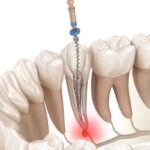Tooth sensitivity is a pain or discomfort in the teeth experienced when eating or drinking hot, cold, or sweet foods. Wearing away a protective layer on the tooth, called enamel, causes pain by exposing the sensitive parts underneath. The following is an overview of the causes of sensitive teeth and effective treatments to solve them.
How Does Tooth Sensitivity Feel?
Tooth sensitivity is described as sharp pain or discomfort, and it is for a short time that comes and goes. You might feel it when you consume ice cream, drink a glass of cold water, or even breathe in cold air through your mouth. Sometimes, sweet or acidic foods have been known to cause the pain.
Pain may be sudden, involving one or many teeth. Moreover, understanding the reason for sensitive teeth can help in addressing and managing these issues effectively and conveniently.
Causes of Sensitive Teeth
There are many reasons your teeth may become sensitive. Let us discuss the common causes:
1. Enamel Wear
Over time, due to some factors, your enamel will wear away. Too hard brushing—mostly using a stiff toothbrush—will thin out the enamel. This exposes the dentin below and leaves your teeth sensitive. Toothpaste containing abrasive particles will also aid in thinning the enamel over time.
2. Gum Recession
Gums work as a protective covering on the roots of your teeth. In case your gums draw back or recede, then the roots may be exposed. This can make your teeth sensitive to heat or cold food and drinks.
3. Tooth Decay
Tooth decay or cavities are yet another source of sensitivity. If a tooth decays, it wears away the enamel, making tiny holes that expose the dentin. It makes the accessibility to the nerves easier by cold, heat, or something sweet (food and drink) that may cause pain.
4. Cracked Teeth
Cracks in teeth might cause sensitivity. When a tooth cracks and you consume food, the substance enters the mouth and begins to irritate the nerves. The crack could be so small that you can’t view it, but it gives sharp pain when you eat or drink cold or hot substances.
5. Teeth Grinding (Bruxism)
Grinding teeth during the night can damage the tooth enamel. Therefore, it can escalate more issues, like sensitive teeth and more.
6. Acidic Foods and Drinks
Consuming foods and drinks that are high in acids—like citrus fruits, soda, or vinegar—will gradually wear down your enamel. When the enamel wears down, it exposes your dentin and makes your teeth sensitive.
7. Dental Procedures
Fillings, crowns, whitening treatments, and other dental procedures may cause tooth sensitivity. This occurs because the procedures can damage the enamel or irritate the nerves within your teeth. The sensitivity normally resolves after a few days, although there are times when it lasts longer.
How to Fix Sensitive Teeth?
Several ways help reduce the pain and protect your teeth. Here are a few remedies for sensitivity of teeth that can help you to fix sensitive teeth.
1. Use a Toothpaste for Sensitive Teeth
Use special toothpaste that aids in decreasing the sensitivity of your teeth. These toothpastes contain potassium nitrate or stannous fluoride, which can block the sense of pain by shielding dentin and nerves in your teeth. Use this toothpaste at least twice a day, and you will notice an improvement after a while.
2. Use a Soft Toothbrush
A soft-bristled toothbrush is smoother on your enamel as well as on your gums. This may protect your enamel from future damage and reduce gum recession. Furthermore, brush gently in a circular motion to ensure you don’t rub too hard on the teeth and gums.
3. Watch out for Acidic Food and Liquids
Enamel can be preserved by avoiding the intake of acidic foods and beverages, especially wine, soda, and citrus fruits. If you need to eat or wish to eat acid-containing items, rinse your mouth with water to clean the acid. Additionally, wait around 30 minutes before brushing your teeth because cleaning your mouth soon after consuming acid might further erode the enamel.
4. Use Fluoride Treatments
Fluoride is a mineral that can strengthen your teeth and keep them free from decay. If you have sensitivity in your tooth, your dentist may suggest fluoride treatments. Furthermore, you can use fluoride toothpaste or mouthwash from the comfort of your own home.
5. Dental Bonding or Sealants
If your enamel is worn down or your dentin is exposed, then dental bonding or sealants are recommended by a dentist near you to shield teeth from further harm. These treatments include applying a protective coating over sensitive areas of your teeth. This helps to numb the pain sensation and protect your teeth from further damage.
6. Treat Gum Disease
If gum recession is the source of sensitivity, the underlying gum disease must be treated. Scaling and root planing are cleaning procedures that your dentist may use to eliminate plaque and tartar that has accumulated beneath your gum line.
7. Mouthguards for Teeth Grinding
Wear a mouthguard to reduce the impact on your teeth, thereby reducing enamel loss and cracks, which might help to prevent the need for tooth sensitivity treatments. Patients may need to wear a mouthguard while they sleep to protect their teeth from grinding. Professional mouthguards are custom-fit for your teeth to give you optimal protection.
Call Us Today For A Comfortable Dental Experience!
If you discover that you are suffering from sensitive teeth, especially if it lasts for a long time, you should arrange a dental appointment immediately to treat it.
Acorn Dental & Implant Centre is committed to offering quality dental services. Our team of dentists in Rutland is experienced and offers effective treatment that solves patients’ dental issues. Call us today to schedule an appointment and let our specialists help you achieve a healthy, beautiful smile.







